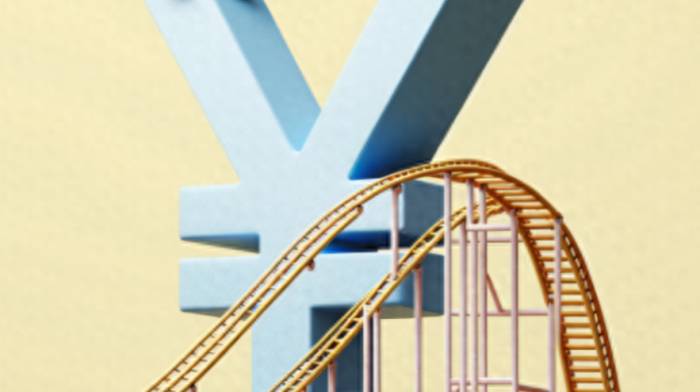Hedge Funds Flee; Yen's Future More Uncertain
Political turmoil in Japan makes it harder for the central bank to escape monetary stimulus measures, but the accelerated depreciation of the yen may trigger foreign exchange intervention, while the U.S. election also poses peripheral risks to the yen...
In the week prior to the ruling Liberal Democratic Party (LDP) of Japan failing to secure a majority in the general election, hedge funds began to short the yen, which could exacerbate its decline.
Data from the Commodity Futures Trading Commission (CFTC) for the week ending October 22nd shows that hedge funds turned net short on the yen for the first time this month. Asset management companies also bearish on the yen, with net short positions reaching 17,226 contracts in the week ending October 22nd, the first time since mid-August.
These figures were released before the results of the Japanese House of Representatives election on Sunday. The election results have cast doubt on the future of Japanese Prime Minister Fumio Kishida, who now needs to find a path to a stable government.
The yen is rarely as much at the mercy of political uncertainty as it is now.
Kishida was initially seen as a supporter of Japan's tight monetary policy, but earlier this month he said the economy was not ready for further interest rate hikes, catching the market off guard. Developments over the weekend could make the yen, which has been hovering near its weakest level since late July, even more vulnerable, as traders seize on local politics and the upcoming U.S. election as new reasons to sell.
Advertisement
Shoki Omori, Chief Strategist at Mizuho Securities, said, "If the government does not stabilize, carry traders, including hedge funds, will easily sell yen," referring to a strategy involving borrowing yen funds to invest in high-yield assets.
In early trading on Monday, the yen fell to its lowest level against the dollar at 153.88, the lowest level in nearly three months. Although investors are concerned that the election results will increase uncertainty in Japan's legislative process, further weakening the yen's appeal, a renewed depreciation of the yen could prompt authorities to intervene to bolster the yen.
The outlook for the Bank of Japan's policy is clouded.
The ruling party's loss of a majority in the parliament increases the likelihood that the new government will need to increase spending, as well as the potential complexity of further interest rate hikes by the central bank.Mizuho Research and Technologies senior economist Saisuke Sakai said, "Regardless of who takes office, the new government will be forced to adopt expansionary fiscal and monetary policies to avoid burdening voters."
In order to firmly hold power, the Liberal Democratic Party (LDP), which has almost always ruled Japan since World War II, may need to court smaller opposition parties, such as the Democratic Party for the People (DPP) and the Japan Innovation Party (JIP), as coalition partners, or at least form policy-based alliances.
Both smaller parties have ruled out the possibility of forming a governing coalition with the LDP, but have indicated that they are open to some policy cooperation.
During the campaign, both the DPP and JIP promised to reduce the consumption tax from 10%. The former's proposal also includes cutting electricity and taxes for low-income individuals.
Sakai said that although Shigeo Ishihara has proposed a supplementary budget of more than 130 billion yen ($8.5 billion) last year, he may face pressure to demand a package exceeding 2 trillion yen.
Analysts said that an increase in political turmoil could make it more difficult for the Bank of Japan to break away from decades of monetary stimulus measures.
The Bank of Japan ended negative interest rates in March and raised the upper limit of short-term interest rates to 0.25% in July, as it believes Japan has made progress in consistently achieving a 2% inflation target.
Bank of Japan Governor Haruhiko Kuroda has vowed to continue raising interest rates, and economists do not expect significant changes in its policy direction in the short term.

However, analysts said that if the composition of the Diet changes significantly, the Bank of Japan may lose the political stability needed for smooth interest rate hikes.
"With this political noise, the threshold for the Bank of Japan to raise interest rates again before the end of this year is higher," said Masahiko Loo, senior fixed income strategist at State Street Global Advisors.The leader of the Democratic Progressive Party, Yui Yuichi, criticized the Bank of Japan for raising interest rates too early. The Innovation Party proposed legislative reforms that would authorize the central bank to pursue objectives beyond price stability, such as maintaining nominal economic growth rates and maximizing employment.
Conversely, Japan's largest opposition party, the Constitutional Democratic Party, has called for the Bank of Japan's inflation target to be lowered from the current 2% to "above zero," which would reduce the threshold for further interest rate hikes.
Meanwhile, a weak yen could increase the cost of imported raw materials, drive up inflation, and harm consumption, thus becoming a headache for Japanese policymakers.
"If the yen depreciates to 160 against the US dollar, the Bank of Japan 'will face renewed pressure to raise interest rates to curb the yen's weakness,'" said Takeshi Minami, Chief Economist at Norinchukin Research Institute.
He added that if Trump's victory in the US presidential election on November 5 accelerates the yen's decline, the need for another rate hike could also increase. Trump's tariffs and stricter immigration policies are seen as inflationary policies, which would reduce the need for the Federal Reserve to lower interest rates, thereby pushing up the dollar-yen exchange rate.
"The visibility of the Bank of Japan's policy outlook has significantly decreased," Minami said.
Leave A Commnet
Email address will not be published. Required fields are marked *